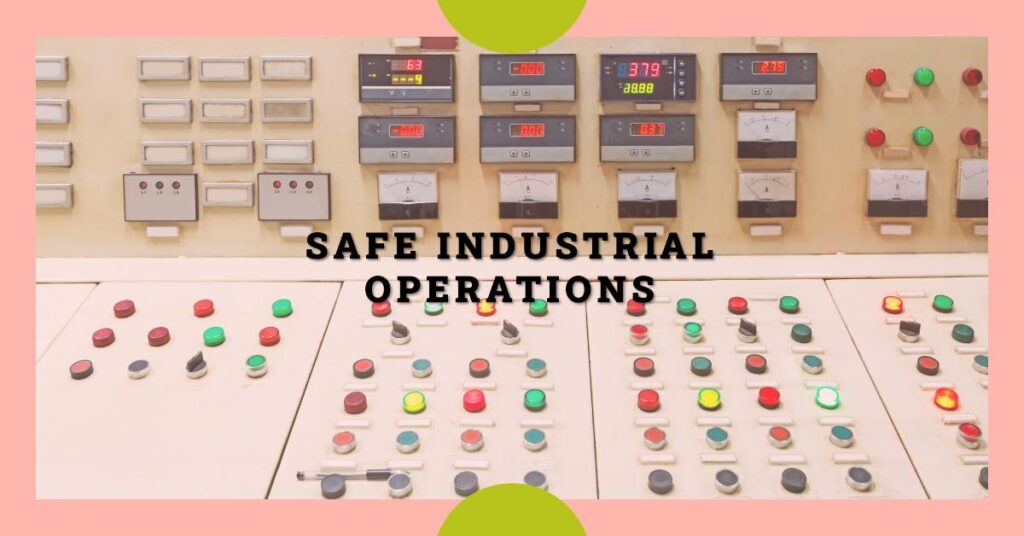Obtaining a Certificate in Instrumentation and Control is key for safe industrial operations. It focuses on risk management, optimizing processes, and hands-on training, fostering a secure workplace. This certification equips you with skills to monitor critical variables, guarantee efficient operations, and minimize safety risks. By troubleshooting instrumentation issues effectively, you contribute greatly to maintaining safe environments and compliance with safety standards. The hands-on experience in automation systems and practical knowledge of control systems enhance your ability to work effectively and safely. This certification is a cornerstone for ensuring safe industrial operations, supporting process optimization, and managing operational costs efficiently.
Importance of Industrial Safety Standards
Understanding the significance of industrial safety standards is vital in ensuring the well-being of workers and the integrity of industrial operations. Safety standards play a pivotal role in mitigating risks associated with industrial processes. By conducting thorough risk assessments, potential hazards can be identified, and appropriate measures can be implemented to minimize the likelihood of accidents and injuries.
Incorporating safety regulations such as IEC 61511 and IEC 61508 helps in establishing a framework for safe operations. These standards provide guidelines for developing safety instrumented systems that act as safeguards in case of equipment failures or process deviations. Additionally, safety standards outline emergency shutdown procedures, ensuring a prompt and effective response in critical situations.
Compliance with industrial safety standards not only reduces the risk of accidents but also enhances the overall emergency response preparedness of industrial facilities. Workers trained in safety procedures are better equipped to handle emergencies, thereby increasing the likelihood of a safe outcome during unexpected events. By adhering to safety guidelines and investing in proper training, industrial operations can maintain a secure working environment while minimizing the potential for disasters.
Role of Process Control Skills
Process control skills play an important role in the monitoring and adjustment of key variables essential for the smooth operation and safety of industrial processes. These skills enable you to manage essential parameters such as temperature, pressure, and flow rates, making sure that the production process runs efficiently and effectively. By leveraging process control knowledge, you can optimize processes to enhance productivity and maintain product quality. Additionally, these skills are instrumental in automating operations, reducing costs, and improving the reliability of equipment.
In industrial settings, proficiency in process control is necessary for equipment maintenance. By understanding how to control various aspects of the production process, you can prevent breakdowns and ensure that machinery operates at peak performance levels. This proactive approach not only minimizes downtime but also contributes to the overall safety of the workplace.
Furthermore, process control skills are integral to process optimization. By continuously monitoring and adjusting variables, you can fine-tune operations to achieve maximum efficiency and output. This optimization not only benefits the bottom line of the company but also helps in complying with regulatory standards and achieving operational excellence. Mastering process control is key to ensuring that industrial processes run smoothly, safely, and at their full potential.
Significance of Safety Instrumentation Training
Understanding the importance of safety instrumentation training is vital for professionals in industrial settings.
It guarantees that safety systems are given the priority they require, reducing the risks of accidents and hazards.
Safety System Importance
Safety instrumentation training plays an essential role in ensuring industrial safety compliance and risk mitigation. Understanding safety instrumented systems (SIS) performance is important for preventing accidents and ensuring operational safety.
Training in safety instrumentation equips professionals with the skills needed to design and maintain safety systems in hazardous areas, focusing on hazard prevention and risk assessment. By adhering to regulatory standards like IEC 61511 and IEC 61508, professionals can enhance reliability, reduce downtime, and protect personnel and assets in industrial settings.
Safety instrumented systems are essential components that contribute to the overall safety of industrial operations, making safety instrumentation training an indispensable investment in maintaining a secure work environment.
Risk Reduction Strategies
Reducing risks in industrial operations through safety instrumentation training involves implementing effective strategies to safeguard personnel and assets while maintaining operational integrity.
Understanding risk assessment techniques and hazard identification strategies is paramount. By acquiring knowledge in safety instrumentation, you can proactively identify potential hazards, assess risks, and implement preventive measures to mitigate them.
This training equips you with the skills to recognize critical safety systems like Safety Instrumented Systems (SIS) and guarantee their proper functioning. Employing these risk reduction strategies not only enhances workplace safety but also fosters a culture of vigilance and compliance with regulatory standards.
Stay vigilant, apply your training, and contribute to a safer industrial environment for all.
Regulatory Compliance Awareness
In order to guarantee full compliance with industry standards, safety instrumentation training plays a key role in equipping personnel with the necessary skills for effective hazard assessment and risk mitigation strategies.
Regulatory compliance awareness is a critical aspect of safety instrumented systems (SIS) training, ensuring that employees understand and adhere to regulations such as IEC 61511 and IEC 61508.
By undergoing compliance training, individuals gain a deeper understanding of emergency shutdown systems and the significance of critical alarms in industrial settings. This heightened regulatory awareness not only helps in preventing workplace accidents but also reduces environmental risks associated with non-compliance.
Maintaining a safe working environment hinges on personnel being well-versed in compliance requirements, making safety instrumentation training an indispensable component of industrial operations.
Hands-On Experience in Automation Systems
When you engage in hands-on experience in automation systems, you get the chance to put your theoretical knowledge into practice within real industrial settings.
This practical training not only hones your troubleshooting skills but also enhances your ability to solve problems in intricate industrial environments.
Exposure to various automation systems provides you with an in-depth understanding of control mechanisms and instrumentation principles.
Practical Automation Training
Practical automation training provides essential hands-on experience with industrial automation systems, enhancing skills in real-world applications. Through hands-on practice, students develop proficiency in setting up, configuring, and troubleshooting automation systems, vital for ensuring operational efficiency.
The training focuses on system optimization and equips individuals with troubleshooting skills necessary for addressing challenges in industrial automation environments. By implementing safety protocols learned during practical automation training, individuals contribute to safe industrial operations.
This hands-on experience enables students to optimize automation processes, ensuring smooth functioning and enhancing overall safety in industrial settings. The technical know-how gained through practical automation training prepares individuals to work effectively and safely with automation systems, contributing to a secure industrial environment.
Real-World System Applications
Exploring real-world system applications through hands-on experience in automation systems provides invaluable insights into the practical implementation of control principles in industrial settings.
Practical training offers a unique opportunity to directly engage with industrial automation technologies, fostering a deeper understanding of their practical application. By gaining exposure to real-world applications, individuals can better grasp the complexities involved in maintaining safe industrial operations.
The application of theoretical knowledge in hands-on settings not only enhances comprehension but also hones troubleshooting skills essential for optimizing automation systems.
Hands-on experience in automation systems equips individuals with a thorough understanding of how instrumentation and control systems contribute to the safety and efficiency of industrial processes. This practical experience is invaluable for preparing individuals to address the intricacies of system implementation in industrial environments.
Practical Knowledge of Control Systems
In gaining practical knowledge of control systems, individuals learn essential skills for configuring and troubleshooting industrial control systems effectively. This knowledge includes expertise in control system troubleshooting, system optimization, instrument calibration, and data analysis.
Control system troubleshooting is vital for identifying and resolving issues promptly to maintain operational efficiency and safety in industrial environments. Understanding system optimization allows for fine-tuning control loops to enhance the overall performance of control systems, ensuring they operate at peak efficiency.
Moreover, the ability to calibrate instruments accurately is fundamental in ensuring precise control of variables such as temperature, pressure, and flow rates. Instrument calibration guarantees that the data collected and actions taken by the control systems are accurate and reliable, contributing to the overall safety and effectiveness of industrial operations.
Additionally, proficiency in data analysis enables individuals to interpret data from control systems effectively. This skill is essential for making informed decisions that contribute to maintaining safety in industrial settings.
Risk Reduction in Industrial Environments
With a focus on risk reduction in industrial environments, the Certificate in Instrumentation and Control equips professionals with the necessary skills to identify and mitigate potential hazards effectively. Hazard identification is a critical aspect covered in the curriculum, enabling individuals to recognize dangers such as pressure fluctuations, temperature anomalies, or irregular flow rates that could lead to accidents. Through risk mitigation strategies, professionals learn how to proactively address these hazards to prevent potential harm to personnel and equipment.
Moreover, the certificate program emphasizes the implementation of safety protocols to maintain secure working conditions. By monitoring and controlling variables like pressure, temperature, and flow rates, individuals can make certain that operations remain within safe limits. This proactive approach not only minimizes risks but also contributes to the overall safety of industrial environments.
In addition to hazard identification and safety protocol implementation, the Certificate in Instrumentation and Control prepares professionals to handle emergencies effectively. With proper training in emergency response procedures and the ability to utilize instrumentation and control systems, individuals can swiftly react to unforeseen situations, mitigating the impact and preventing accidents before they escalate. The focus on risk reduction within the program ensures that graduates are well-equipped to promote a culture of safety and adhere to regulatory standards in industrial settings.
Enhancing Operational Safety Measures
To improve operational safety measures effectively, professionals undergoing the Certificate in Instrumentation and Control training focus on implementing advanced monitoring and regulation techniques for critical variables. By mastering the skills to monitor and regulate factors such as pressure and temperature, individuals can enhance operational efficiency and guarantee a safe working environment. The training covers calibration procedures essential for maintaining accurate measurements, a vital aspect of preventing accidents and ensuring equipment and process safety.
Furthermore, understanding control systems and safety protocols enables professionals to identify and mitigate potential hazards in industrial environments proactively. Implementing preventive measures based on this knowledge is key to minimizing risks and promoting a culture of safety within industrial operations. Compliance with regulatory standards is also a significant focus of the training, emphasizing the importance of adhering to guidelines to prevent accidents and enhance overall operational safety.
Through the Certificate in Instrumentation and Control program, individuals gain the expertise needed to enhance operational safety measures by implementing best practices in monitoring critical variables, maintaining accurate measurements, and adhering to safety protocols. This holistic approach not only fosters a safer work environment but also contributes to improved efficiency and productivity in industrial settings.
Ensuring Efficient Working Environments
Professionals proficient in the Certificate in Instrumentation and Control guarantee efficient working environments by meticulously monitoring and regulating critical variables essential for industrial safety. By continuously overseeing parameters such as temperature, pressure, and flow rate, these experts ensure that processes run smoothly and without disruptions, fostering efficient operations within industrial settings. This meticulous control not only enhances overall efficiency but also plays a pivotal role in maintaining workplace safety.
Efficient processes are a cornerstone of safe industrial operations. With a focus on precision and accuracy, individuals with a Certificate in Instrumentation and Control can calibrate instruments to perfection, thereby optimizing performance and reliability in industrial activities. This attention to detail not only minimizes the risk of errors but also contributes to the seamless functioning of essential systems, promoting a safe and productive working environment for all involved.
Moreover, the skills acquired through training in Instrumentation and Control enable professionals to automate tasks, streamline workflows, and drive down operational costs. By effectively managing and controlling industrial processes, individuals with this certification uphold the highest standards of workplace safety while ensuring that operations remain efficient and effective.
Overall Contribution to Industrial Safety
The Certificate in Instrumentation and Control plays a vital role in enhancing industrial safety by equipping professionals with the necessary skills to monitor and regulate critical variables essential for efficient and reliable operations. Through accurate measurement and control of variables such as temperature, pressure, and flow rate, the certificate aids in risk mitigation by ensuring that industrial processes operate within safe parameters. This ability to monitor and adjust critical factors promptly not only enhances process reliability and efficiency but also minimizes safety risks in industrial settings.
Professionals with a Certificate in Instrumentation and Control play an essential role in maintaining safe working environments by troubleshooting instrumentation issues effectively, reducing downtime, and addressing safety concerns promptly. By mastering the skills to maintain and calibrate instruments in compliance with safety standards, these individuals contribute significantly to overall industrial safety.
Moreover, the practical training provided in this certification program empowers professionals to optimize processes, manage operational costs efficiently, and automate systems where necessary. This optimization and automation not only enhance productivity but also promote industrial safety by reducing human errors and minimizing potential hazards. To summarize, the Certificate in Instrumentation and Control serves as a cornerstone for ensuring safe industrial operations through its focus on risk mitigation and process optimization.
Conclusion
In summary, obtaining a certificate in instrumentation and control is like having a compass in a dense forest – it guides you towards safe industrial operations.
With a strong foundation in process control skills, safety instrumentation training, and hands-on experience in automation systems, you’re equipped to reduce risks, enhance operational safety measures, and guarantee efficient working environments.
This certification plays a significant role in maintaining overall industrial safety standards.




